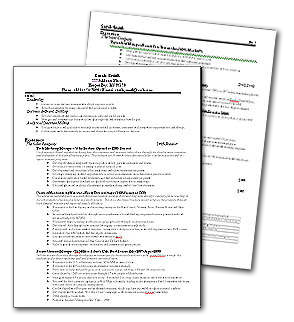Resume Tips
 In most cases, employers prefer a chronological, as opposed to a functional format. Your resume should be clear and precise and should demonstrate progression, success, and stability.
In most cases, employers prefer a chronological, as opposed to a functional format. Your resume should be clear and precise and should demonstrate progression, success, and stability.
It is prudent to update your resume anytime you get a new job, a promotion, complete a major accomplishment or receive a new responsibility. Because so many things happen at your job, it is hard to recall all that you do when updating your resume. Take notes on your new responsibilities periodically so that you are always ready to update your resume. In this market, you may change jobs every two to three years on average, and you owe it to yourself to be prepared.
Components of an Effective Resume:
Contact Information
Your name, address, phone numbers (including home and if applicable, mobile), and email address should be listed at the top of your resume. A work phone number and email address are optional.
Objective
An objective is typically a few sentences. It conveys your top qualifications for a particular job and demonstrates to a prospective employer that you have a strong sense of direction.
Work Experience
1. You are trying to sell yourself with your resume, so when you expound upon your experience don't just list responsibilities - list accomplishments. Demonstrate to the reader that you can do the job. Remember the old adage, "Don't just tell me, show me!" State quantified results.
2. Eliminate irrelevant work experience. Concentrate on your work experience that is relevant to your current goal. Employers are most interested in your recent work experience. If you have a long career history, focus on the last 10-15 years. If your early career experience is relevant, be concise by stating the position title and years' experience, but don't delve into great detail. Alternatively, after your recent work history, you can list your other work experience under the heading "Prior Relevant Experience" without dates.
If employed by the same company for your entire career, list each position separately to show your progression.
3. Eliminate from your resume unnecessary phrases such as "responsible for" or "duties include." Instead use powerful and effective action verbs to convey your responsibilities and duties. Some examples include:
Accepted, Accrued, Achieved, Acquired, Administered, Advised, Analyzed, Anticipated, Appointed, Arranged, Assessed, Audited, Avoided, Centralized, Certified, Championed, Collaborated, Combined, Composed, Conceived, Concluded, Conducted, Controlled, Converted, Corrected, Created, Decentralized, Decreased, Defined, Demonstrated, Designed, Determined, Developed, Devised, Directed, Effected, Eliminated, Employed, Enforced, Established, Evaluated, Executed, Expanded, Expedited, Extracted, Forecast, Formed, Formulated, Gave, Generated, Hired, Illustrated, Implemented, Improved, Improvised, Initiated, Inspired, Inspected, Instructed, Insured, Interpreted, Interviewed, Introduced, Investigated, Launched, Liquidated, Located, Maintained, Managed, Measured, Minimized, Modernized, Negotiated, Observed, Obtained, Offered, Operated, Organized, Originated, Passed, Planned, Prepared, Presented, Prevented, Processed, Procured, Produced, Provided, Published, Purchased, Recommended, Recruited, Reduced, Rejected, Related, Reorganized, Reported, Resolved, Restored, Reversed, Reviewed, Revised, Saved, Scheduled, Selected, Separated, Served, Settled, Simplified, Solved, Specified, Staffed, Stated, Stimulated, Streamlined, Supervised, Supported, Surveyed, Tabulated, Terminated, Tested, Tracked, Trained, Trimmed, Upgraded, Utilized, Varied, Verified
4. Education: List your educational degrees either at the top or bottom of your resume, depending on personal circumstances. If you have an MBA from a top ten B-School, for example, this could be a good selling point to prospective employers.
5. Eliminate the use of "References Available on Request." This is automatically implied when seeking employment
6. Eliminate the use of personal pronouns and minimize the use of articles when preparing your resume.
7. Foreign Experience: If you had a job in a different country, in order to avoid confusion, use the American equivalent to the job title. If you attended a foreign university, specify the university that you graduated from, then write something akin to, "degree equivalent to U.S. MBA in Marketing and Management."
8. Alternative Employment: Occasionally people take time off to go back to school, become full-time parents, travel or pursue other avocations. This doesn't necessarily cause a "gap" in your employment. In these situations, you can either leave those periods of time alone and let your recruiter explain your situation to the prospective employer or simply include what you were doing as part of your chronological career progression. If you were self-employed, use the name and list yourself as a consultant. List any assignments and add, "Client references available upon request."
9. Do not include any references on your actual resume. Provide your references when the employer requests them.
10. Do not include any salary information on your resume.
11. Hobbies/Interests: Optional. You can list hobbies that reflect positive, outgoing attributes that in some way support your objective.
Note: One typo can land your resume in the "circular file" (a.k.a. recycle bin), so enlist the help of family or friends to help you proofread - don't rely on spellcheck to catch your errors. Your resume is a reflection of you , so it should be perfect!
Here are some examples of resumes that have caught the attention of Hiring Sources:
SALES






